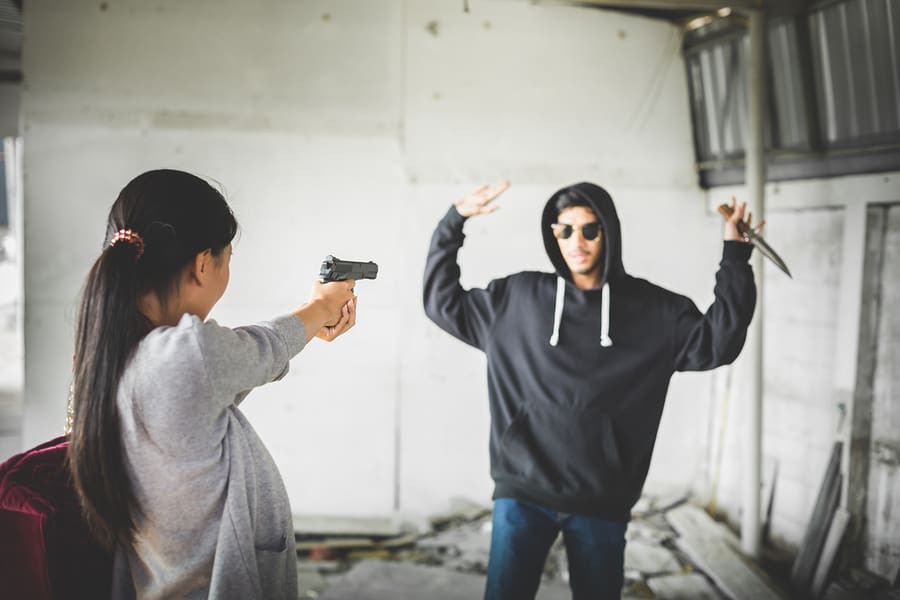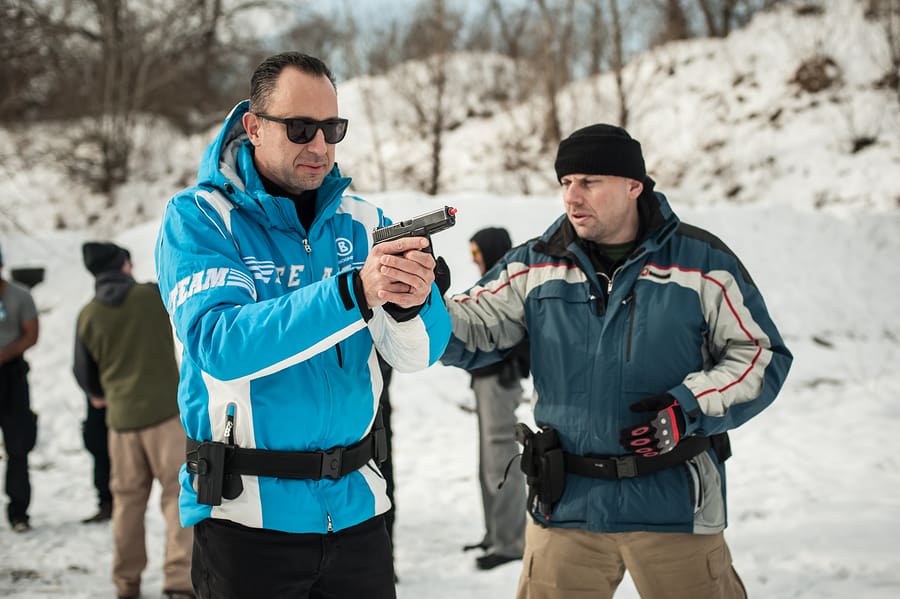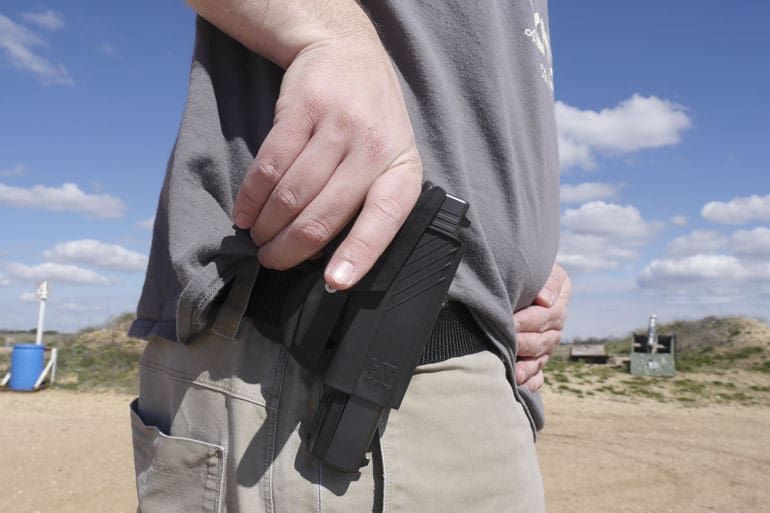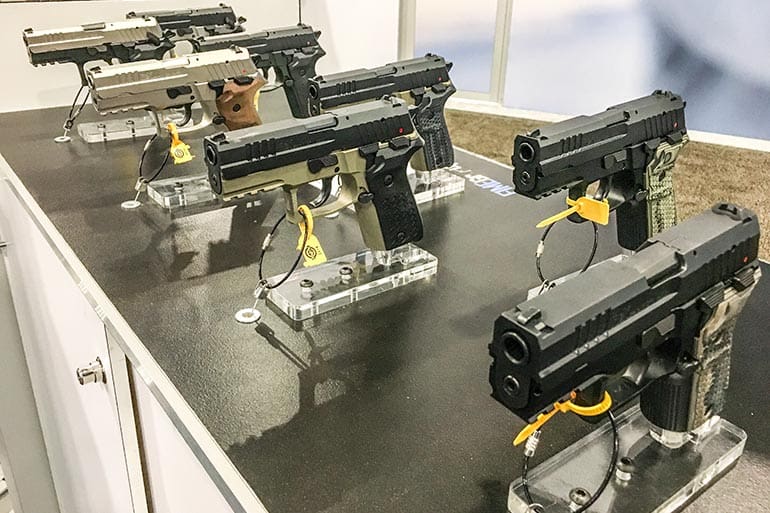Millions of Americans exercise their right to keep and bear arms every day. And millions more are making the decision to start each year. It’s not always an easy transition. Newbies face a flurry of firearms choices: type of gun, caliber, storage, carry method, holster(s) and more.
Like any journey, the path to self-defense gun ownership begins with a single step. Or in this case, three. Here are a few practical questions first-time gun buyers should ask themselves . . .

1. Am I willing to shoot another human being?
When I debate gun control, I ask antis a simple question. “If you had a gun and someone was about to attack you or your loved ones – really attack you – would you use the gun to defend yourself or your loved ones?” Believe it or not, some of them say “no” or “I don’t know.” If that’s you, don’t buy a gun. Chances are a bad guy will disarm you and bad things will happen.
One way to explore this issue: Google and read your state’s laws on the legal use of deadly force. While that won’t fully address any moral qualms you may have surrounding a defensive gun use (DGU), it’s reassuring to know there are accepted rules for shooting another person in self-defense. Generally, you can shoot someone only if they pose an imminent, credible threat of death or grievous bodily harm.
Range time will also reduce the natural anxiety about that possibility. Hands-on experience with a gun (or better, guns) shows that you that you can control your actions when loading, handling, holding and shooting a firearm.
You can demonstrate to yourself that you don’t have to shoot until you’re ready. That guns don’t just “go off” on their own (a fear shared by many people who’ve never shot one). That you can shoot when you want to.

2. Can I keep my gun pointed in a safe direction?
There are four rules of gun safety: treat all firearms as if they are loaded, don’t point a gun at anything you’re not willing to destroy, keep your finger off the trigger until you’re ready to fire, and be sure of your target and of what’s beyond it.
The second rule is the Mother of All Gun Safety Rules. It should never be violated. If you’re not confident in your own ability to keep your gun pointed in a safe direction, don’t buy one.
How do you know if you’re capable? Ask yourself a simple question: how safe am I? Do you always wear a seatbelt when driving? Do you store chemicals, medicines and other potentially dangerous items safely?
Most people consider themselves to be safe and responsible – it’s the other guy who causes car accidents! But be honest. Are you ready for this responsibility? If you’re unsure, spend some time practicing and becoming comfortable with gun safety at the range – before you purchase a gun.

3. Am I willing to practice getting my gun?
The vast majority of defensive gun uses end without a shot being fired. The bad guy (or guys) see the gun and think better of attacking the gun owner. That’s how you want it to be. That calculus depends on how quickly you can show the perp your pistol (or rifle or shotgun).
The best case: carry a handgun with you at all times. If you are bearing arms, you must practice bringing your gun to bear. That requires a carry system (gun + holster) that suits you.
You need a system that allows you to quickly and efficiently draw your firearm if and when you need it. When selecting a gun for carry, ease of presentation should be one of your primary concerns. It’s more important than make, model or caliber.
If you’ll be depending on a stored handgun, rifle or shotgun for self-defense, the same need for quick access applies. Before you buy a gun, think about how you’re going to store it. If you’re locking it up, are you confident that you can get to it quickly? Combination, biometric or key safe? Where will you store it?
In all cases, practice retrieving your gun. (Unload the firearm first and keep the ammunition away from the gun when you do.)
The first rule for winning a gunfight: have a gun. Any gun.





Yes, have a gun. The single most important bit of training is safe gun handling. As was stated most dgu’s are settled without firing a shot. We handle our firearms daily. An accidental shot can be a disaster.
I know several folks that have bought one gun for a bad moment. They aren’t gun people and they don’t want to get into all the ins and outs and history of firearms. They just want the ability to protect themselves if they need to. To this segment I preach safety, safety, safety. And I recommend a revolver.
I agree with everything you said, except the revolver. They often hurt to fire. Some of the newer semi-autos are better for beginners, so I steer them there: shield EZ, CCP m2, vp9.
I’m a sig fan, but that doesn’t mean my preference matters. Although I’ll tell them to try the P320. 😉 But honestly, the vp9 has better sights. If they must start CCW, shield 9mm.
For a beginner, I also talk safes.
I think the DA revolvurr would be more safe for someone unfamiliar with a hundgan. Most of the a d’ s I’ve seen were with pistols.
Totally agree with Neil. My mother in law is not a gun person, and has a double action only revolver (LCR) as her only gun. She can’t hit shit with that thing because of the heavy trigger pull. Honestly, she can’t even hit a standard silhouette at 10 yards. If she had a situation where a reload was required? Not gonna happen.
A reliable semi-auto with decent magazine capacity and a good trigger is what these people need for their 1 gun.
Remember the story of the old lady who killed an intruder with a .22? She had just bought it, no formal training. Lucky shot placement. (I think it was a year ago.)
My cc gun is a walther p22, loaded with 40 grain rounds. With that said, I am VERY comfortable with it, I hit what and where I aim at, if I have to shoot someone they won’t be getting back up. I know, most everyone here goes for something a lot bigger. But this is the gun I am most comfortable with. Yeah I can shoot my husband’s cannon (CA .45 combat commander) but after the first round I have to pick myself up and reorient, although I’m pretty good at making that first round count.
We had a saying when I worked in the ER, if you really hate someone shoot them with a 22, even if you only hit them in the leg it’s likely to bounce around all over inside them and create all sorts of havoc.
I’m really on the fence about the revolver. I believe the g19 is this era’s model 10 k frame. But for the folks that are not gun people, and I know some of these, the service type revolver is still slightly better. No need to learn to tap, rack or how to clear a stovepipe, etc.
For a person that is going to go further with their gun skills, then yes, an automatic.
One of the non gun types that I had lengthy talks with and took shooting picked a short shotgun for his one gun.
First rule if gunfight, have a gun. It is most important to be comfortable with a gun. Take a multi-hour class. At my range, it is two hours of class before touching a gun. There is no one gun to rule them all. I prefer simple (striker) for 1st time owners. Safeties are often (30% of the time per Berretta’s survey) forgotten. I prefer SA/DA, but to each there own. Practice. It takes several thousand rounds to stop being a Yahoo.
No follow up on the Houston no knock raid that…surprise surprise…turned out to be total BS?
They’ll call you an America Hating Commie here for pointing that out.
https://www.google.com/amp/s/www.houstonchronicle.com/opinion/editorials/amp/Cops-lied-people-died-Here-s-how-HPD-can-13622823.php
https://www.google.com/amp/s/www.houstonchronicle.com/opinion/editorials/amp/Cops-lied-people-died-Here-s-how-HPD-can-13622823.php
Since I’ve had a table set up at large gun shows for 30 years or so, I’ve seen thousands of people buy their first handgun. While self-protection is always one of the stated goals, just being able to go out somewhere and do some casual shooting is generally a very close second. If the person in question is already a handgun-owning shooter I’d buy into those “3 questions” somewhat, but an actual newbie? Nope.
When Iowa first passed concealed carry on demand, hundreds of LCP-, LCR- and J Frame types left the shows, even Glock 19s and the compact HD types, proud owners going out to learn to shoot them and have some fub. Next show, about 2/3 of them were coming back in to trade, the owners finding that these weren’t the best choice to take the old lady out and shoot a few cans and junk out back.
I believe the first real question to be: Is self-protection- actually carrying this thing on my body- really the primary purpose for this purchase or do I really also want to have some recreational shooting available to me with it?
I shoot my G43, .40 Shield, P365 and 638 J Frames quite a bit to stay familiar with them but I consider that all necessary “work”. When I want to have fun, it’s with my 1911s, even the G23 or G19 or N Frames, not to mention the .22 target models. It’s best to try to steer buyers from the belief that one handgun will serve all their needs/desires. (It’s also better for business…)
The first and most important question a potential firearms owner looking for self protection; Must Ask and Answer Themselves is Can I Shoot Another Person? That in itself is the key to self protection firearms ownership. Many people never ask themselves because they can’t face the fact that they may have to kill someone. They get caught up in the idea of firearms ownership without the potential consequences. Taking a life is not an easy thing and people are taught from an early age that one should never do it. I have had people ask me about getting a firearm. The standard what do you shoot? What should I get? Never anything about making the decision to use that firearm on another person. If that question can’t be answered honestly after a long period of contemplation. The I always suggest waiting until it is answered. Owning a firearm for protection without knowing if you can truly use it. Can get you killed quicker than not having one. Never assume you can shot someone. You Must not only Know you can Do It. You have to be able to accept that you can without the guilt of taking another life. Which can be easier said than done. Keep Your Powder Dry…
The first and most important question a potential firearms owner looking for self protection; Must Ask and Answer Themselves is Can I Shoot Another Person? That in itself is the key to self protection firearms ownership. Many people never ask themselves because they can’t face the fact that they may have to kill someone. They get caught up in the idea of firearms ownership without the potential consequences. Taking a life is not an easy thing and people are taught from an early age that one should never do it. I have had people ask me about getting a firearm. The standard what do you shoot? What should I get? Never anything about making the decision to use that firearm on another person. If that question can’t be answered honestly after a long period of contemplation. The I always suggest waiting until it is answered. Owning a firearm for protection without knowing if you can truly use it. Can get you killed quicker than not having one. Never assume you can shoot someone. You Must not only Know you can Do It. You have to be able to accept that you can without the guilt of taking another life. Which can be easier said than done. Keep Your Powder Dry…
Damn- that was so good they repeated it…
For some, I’m certain, the “situation at hand” may change their mindset. (Either way, too.)
“If you had a gun and someone was about to attack you or your loved ones – really attack you – would you use the gun to defend yourself or your loved ones?” Believe it or not, some of them say “no” or “I don’t know.” If that’s you, don’t buy a gun. Chances are a bad guy will disarm you and bad things will happen.”
Stuff and nonsense! Nobody, and I mean nobody knows how they will react until they are actually in a life-threatening situation. That is when you find out what you are capable of doing.
Sorry Bob…make no mistake I can and will if and when I deem the situation necessary. I will do so with no regret or sympathy. I would have more feelings of regret for running over an animal on the highway than shooting an attacker attempting to harm me or mine. Nuff Said…
It is good to have a positive attitude.
Positive Ventilation is a good thing…. for the OTHER guy!
To be able to point your gun in a safe direction you need to have a safe. Now not all safes are equal, you don’t want a bullet to bounce off of it and get stuck in yor head. That’s what many folks tend to forget.
Why do you need to ask 1? You should only be shooting violent criminals and other rabid animals, not humans.
Better article:
Three Questions to ask when buying a carry gun:
1: Is it a 1911?
2. Yes.
3. No.
While I could take a life of someone who threatened my life or family members’ life, others might not be able to do so. There are stun guns and tasers designed to incapacitate a threat. Not my choice, but someone who is worried about it should take a look at these forms of self defense. There are also rubber bullets, bean bag rounds and the like that should slow most people down.
The chances that a regular person would come in contact with a juiced up PCP fiend are small, I would think that for most situations, .32 would be adequate(I don’t want to be shot with any caliber bullet).
YMMV, so try to teach your loved ones that kill or be killed is the real choice…..
Contrary to what lots of retards spew, I don’t recommend lcr’s Lcp’s or other keychain guns as first guns especially for women. Small guns are harder to shoot well simply because there isn’t enough of them to hold onto during recoil. I tell my students to buy a full size gun and learn how to shoot it. That means going out and practicing. How to align the sights, how to place those aligned sights in a target, how to pull the trigger without disturbing that alignment on target, and to follow through. Also means practicing how to establish their grip because that’s one of the most important aspects of shooting a handgun correctly. Then, once they have become proficient at doing that, then, go look for a smaller compact gun. Try as many as you can before you buy one. You don’t get your drivers license and get into a Ferrari, you learn first in a Toyota camery.
Totally agree. There is a tendency, particularly among women who are unfamiliar with firearms, to want a smaller gun based on the idea that it’s less intimidating for them. While understandable, this is a backward way to look at it for the exact reasons you specified. I’ve been teaching my mother to shoot for the better part of a year; she purchased a Ruger SP101 with a 2” barrel as her first gun. I was not consulted on that purchase, but she figured out pretty quickly that smaller isn’t necessarily better after shooting her gun side by side with my 4” Ruger Police Six
This is the reply I was looking for. Smaller guns are not practical for home protection. My main piece, the one that’s always nearby, is a G17 because it’s big. I might not care about how it looks and that’s ok, it wasn’t designed to be pretty, it was designed to be useful. I have other guns and I like them the same, but for all intents and purposes I keep that one with me because I know it handles well.
I believe that I could and would shoot a person that was attacking my family or me. I can’t answer that 100% until I am in that situation. Hopefully I’ll never have to answer the question. I am a little concerned about the person who says having to shoot another person wouldn’t feel any regrets. If I had to do it, no matter how necessary it was, I would still feel regret that I had to harm or kill another human being.
Factor in that the attacker will move on to “do” someone else if you don’t stop them and you have a lot less to feel bad about. Many scumbags hit DOZENS of people OR MORE before they meet one that’s prepared to deal with them on an equal footing. How many of those folks WON’T be attacked because YOU were ready? You may never know, but you protected them.
Saw a story about a carjacking in Chicago that went bad. Kids were in car seats in the back when the Mom was pulled from the car by two dirtbags. She dusted herself off while drawing a semiauto (licensed) and opened fire. Her kids were the only thing she was thinking about. Must have had seriously heightened reflexes because she shot them both…. dragged them out of the car and held them for the cops. THEY said the guys had done this exactly the same way several times before and were NEVER caught. BRAVO!
#3 My hammerless J-frame requires a holster and practice? Really? That’s news to me.
Not just practice: TRAINING. LOTS of TRAINING. Training until your eyes bleed. Training so sophisticated and arduous as to enable you to take on literal MULTITUDES of serious Operators Operating Operationally with semi-fully-automatic assault weapons and WIN any battle although caught completely by surprise.
Oh, and a neck-beard. And Oakley sunglasses. And a baseball cap with the brim rolled ‘just so.’
Maybe a tattoo.
And 5.11 pants.
And something made out of woven 550 paracord. With a knife in it.
And a thing in the back that goes up, and serves as both a compass and a thing that tells time.
THEN you can carry that hammerless J-frame. Not before.
LOL !!!
Great, now I got neck beard envy.
Do you stand inside the barn when you shoot for the broad sides?
To add to the list, some new folks may consider a better understanding of Situational Awareness (especially in transitional spaces). Another is making sure they have CCW insurance (a retainer for legal services after a DGU) set up prior to carrying.
Wow, that actually tops #3 in importance in my opinion.
What good is being well practiced with a gun if your situational awareness is shit?
Some people just have it naturally, some people can acquire it, and some people will simply never acquire it, even if they’ve been cornered, mugged, or worse in the past.
If I had a dollar for ever city person I knew who had decent situational awareness (acquired from spotting and dodging aggressive street people, and sidestepping sidewalk dog shit) but were clueless with firearms and other forms of defense, I’d be rich.
Agree on situational awareness. I don’t agree that carry insurance is right for most people.
If you are worried about civil side the issue is how much equity is in your name. If you have moderate to high equity, nine times out of ten, you are a lot better off with standard umbrella which protects your equity, including with insurance company provided and paid attorneys, much better since it also protects against more common civil actions than defensive gun use. Examples an umbrella would also cover are people slipping on your sidewalk, people suing you because you served a pal two beers and he hit their car and injured them, a friend of your kids getting food poisoning at your home, and many other cases. If you have hyper high equity you already have most of it in trusts.
If you are worried about the criminal side, the only thing carry insurance does is get you a mediocre lawyer. If you have credit or usable equity or any way to get $20k you do not need legal insurance to get a very good criminal defense attorney.
so with insurance it depends and most of the people I know with it do not know what their carry insurance covers and what it does not, and many are better off using other risk reduction/legal representation strategies.
I disagree with point #1
Even if you are a complete pacifist and would never shoot anyone, some huge percentage (ive heard 90%?) of DGU’s don’t involve shots fired. Just the presentation of the firearm solves the problem.
Well maybe not 100% disagree. You should still ASK yourself if you are willing to, but even if the answer no, you can still carry
If it doesn’t you may be a statistic.
(1) “Am I willing to kill another human being”? Yes, as a last resort. With anything I can get my hands on. (in a deadly threat situation). (2) Point a firearm in a safe direction? The only safe direction is at the threat. (3) Fire a firearm before you actually have to, zero it, know it, clean it, like your life depended on it. There is one in a million chance you will ever have to use it, but you don’t know which one. If you have a family, wife, kids, think and think again. That firearm will not go off by itself, do not leave it unattended and out of your control. Military and civilian concepts are different but the principle is the same, kill or be killed.
magnificent submit, very informative. I wonder why
the other experts of this sector do not understand this.
You must continue your writing. I am confident, you’ve a
great readers’ base already!